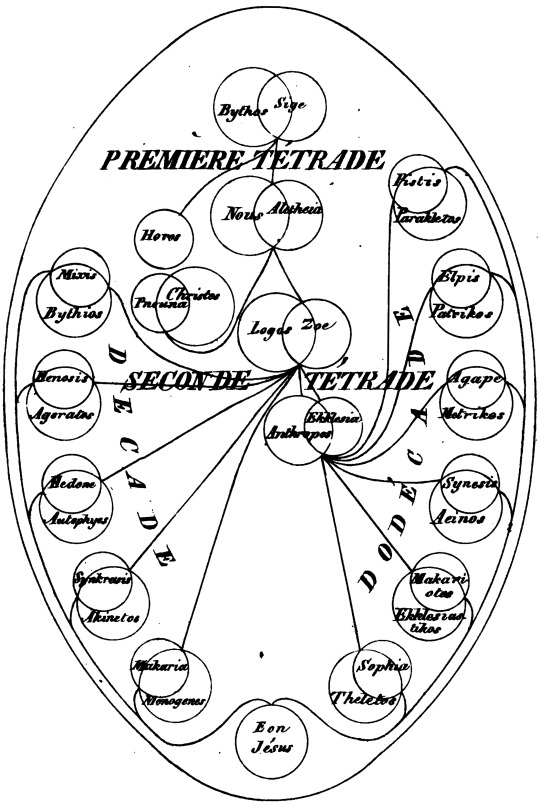#I've been threatening to go on a ramble about gnostic philosophy since the start of this movie
Explore tagged Tumblr posts
Text
14/30 Gnosis, and lack thereof
(Previous) | (Index) | (Next)
⛬
We return to the movie that could’ve been a contender, Prometheus. In this episode, a two-year-old poisons a man.

I’m not alone in thinking David is the most well-realized character in this movie. Michael Fassbender was given the most space to act through expression and reaction to others and his environment, which helps create an android character that has much more inner life than his human castmates. He also gets what I’d call the Data bonus: android characters can more easily get away with screamingly clunky exposition or explicitly stating the meaning of a scene. You can give them absolute gibberish if you want to, and it sounds perfectly logical when they say it.
youtube
[Video description: A small selection of technobabble from Star Trek: The Next Generation, mostly featuring Data.]
David is also the easiest to be sympathetic to, because people keep being assholes to him.

Yes, David has received mysterious orders from a mysterious man who’s still in stasis. It’s Peter Weyland. It’s obviously Peter Weyland, this is why David has the dream-reading helmet thing that felt so out of place at the start of the movie. This is also why Guy Pierce, a 45-year-old, was hired to play an infinity-year-old man. Weyland was going to appear as his ideal self in one of these dream sequences, but it was cut from the movie. So instead, we just have Vickers demanding to know what “he” wants, and the answer is “Try harder”.
Peter Weyland, beginning a trend for the company bearing his name, has an obsession with this alien stuff. …This trend was actually begun by Charles Bishop Weyland in a completely different continuity that also featured ancient alien contact with Earth, but hey, details. This Weyland wants results, damn it, and David gets an excuse to kill one of the crew.

Although it’s not quite that simple. The movie indicates that David can’t go against orders from the company, especially from Weyland. He has to “try harder”, and he’s brought back one of those alien urns that apparently nobody cares to examine but him.
It’s got a goth lava lamp in it.


While we don’t get much indication David knows why this stuff is dangerous to organic life, I’ll give the movie a very tiny pass: it’s implied that David has figured out how to read the Engineer’s cuneiform script. He decants a droplet of Menacing Black Goo onto his (Weyland-branded) fingertip, and sets off to find a test subject.
Thank god, he chooses Holloway.

I don’t like not liking characters. I don’t generally anticipate seeing someone’s comeuppance, but this movie gets me damn close to that feeling. In the movie’s partial defense, some of this was probably intended. Mainstream American fiction sets a high bar for what a bigot looks like, and Holloway’s been clearing that. I’m less certain the movie knows everyone’s behaving like a bigot, but we’ll get to that eventually. But Holloway? Definitely.

This creates a fairly interesting scene. One that even reaches towards good. David has the means to kill Holloway. The audience knows this. And we get to watch when he makes the decision to commit to it, and why. And, blessedly, it actually ties into an intentional theme of this movie.

Holloway’s still drunk and miserable–he’d previously muttered that the alien structure on the planet was “just another tomb.”
I, speaking hyperbolically, would consider that grounds enough to off him. He’s an archaeologist who can be sent into a drinking binge by finding a thing made by dead people. An archaeologist. That in itself is such a ridiculous indicator of how unfit this character is for his role.
But no, he wanted to meet his maker, “To get answers.” Sure, lots of people have existential questions they feel are important to them. That is understandable. Even clueless assholes can wonder about that. But it takes an especially hubristic asshole to decide they’re the one worthy of asking someone who might have the answer.

Did anybody notice they didn’t bring any diplomats or orators on this trip? They didn’t bring any cultural exchange gifts with them when they approached the alien structure? They weren’t treating the Engineers as people, just something to discover.
David, someone else they’re not treating like people, asks Holloway “Why do you think your people made me?”, and the answer he gets is “Because we could.” David is quietly but openly disappointed in that.

This is the whiplash of this movie. We have the biggest bunch of shambolic assholes klutzing around, waiting to get killed off by the plot, and then we have David expressing the horror of Valentinian gnosticism.

In brief, because even the wikipedia page says “The theology [...] is extremely complicated and difficult to follow”, the strain of Christian gnosticism expressed by the 2nd century theologian Valentinus believes that the world was created by an ignorant being. They believed there was a benevolent god out there which was/produced Jesus, but the “demiurge” (lit. “craftsman”) who created the world was not this deity. The demiurge was an imperfect, lesser being, that believed itself to be the supreme god of the universe. In Valentinianism, as with other gnostic schools, to be born into the world was to be trapped within a creation of a creature that was prone to fits of abusive behavior.
Gnostic christianity was, at the time, an attempt to square a number of contradictory ideas: the incredibly influential ideas of Plato on the formation of the universe, the growing theology of the new Christian movement, and the examples of divine wrath and jealousy in Jewish scripture, that were hard to square with what early Christians saw as a less violent deity they wanted to worship. There were probably also some anti-Jewish Egyptian myths thrown in as well, depicting their god as a donkey-headed incarnation of the malevolent deity Set. Some may recognize that particular slander from its deployment against early Christians, including our first-ever depiction of Jesus’ crucifixion: a rude bit of graffiti.

In our time, there’s only one remaining gnostic (non-christian) religion with direct continuity to the period, the Mandaeans. Christian gnosticism was deemed heretical, when one of the many different gospels circulating at the time was selected as orthodox in the 4th century, along with an attendant theology. But it remains a fertile ground for philosophers, fiction-writers, and every once in a while someone reinvents bits of it when they hit upon contradictions in christian thought.

The latter seems to be the case with Ridley Scott. He’s sometimes described as an atheist, but his actual statements on the matter show he’s either casually gnostic or a deist, very much influenced by christian doctrine:
“If we looked at the whole thing practically speaking, the Big Bang occurred and then we go through this evolution of millions, billions of years where, by coincidence, all the right biological accidents came out the right way. To an extent, that doesn't make sense unless there was a controlling decider or mediator in all of that. So who was that? Or what was that? Are we one big grand experiment in the basic overall blink of the universe, or the galaxy? In which case, who is behind it?”
https://www.bbc.co.uk/films/callingtheshots/ridley_scott.shtml
Tangent: that question came right after he’s quoted as saying “I think there's no originality [in modern films]. I think everyone is stealing from everyone else and going back to the originals. I usually go in for 20 minutes and then get up and leave.” This interview was back in 2006. The next year he’d direct American Gangster (loosely based on a biography), then Body of Lies (Roger Ebert called it "a James Bond plot"), then Robin Hood (it’s Robin Hood), then Prometheus, the movie I only watched because it seemed to be in dialog with a film he directed in 1979. Buddy, if that was your problem, you were part of the problem.
But anyway. We have a director who had stated interest in a christian-influenced cosmogony: he seems to state a belief that we exist because we are supposed to exist, rather than being a random event. This is a movie where he does seem to be trying to do something with that. He is beginning with that premise, and using Alien as the shared language to express it. He doesn’t know why we exist, but he can imagine why we would make someone exist.
Placing that in amongst these characters is bleak to the point of puerility, frankly. Why would we create a being like us? Well, this one asshole doesn’t know.

David, at this point in Prometheus, has already determined that humans are fallible creators. Hell, he’s decided the Engineers were also failable. He, y’know, witnessed how gooey one of their corpses was. But he’s yet to decide on whether humans are just ignorant, trying and failing to be good–as per Valentinus–or if they’re actively malevolent.


The fact that David doesn’t poison Holloway’s drink until just before handing it over does neatly show that he was quietly given a chance to answer that question. Holloway continues to be a jackass and, when asked what he’d do to answer the existential question he wanted to pose to the Engineers, he says he’d do “anything and everything”.

The movie eventually treats Peter Weyland as especially deluded in his self-serving quest to get the Engineers to answer his more selfish questions, but I don’t think his ego was unique in this movie.
On our journey into the movie this time, Prometheus has attempted to grapple with subjects its script hasn’t earned. Next time, it incorporates imagery it hasn’t earned. It’s worse than this scene, but in a far more subtle way.
If you want a neat look on european and middle eastern mysticism from an academic standpoint, Esoterica is a pretty damn good channel, put together by a self-described “dialectical materialist in the tradition of Structural Marxism”. I’ll happily take recommendations on other academic sources aimed at the general audience.
https://youtu.be/7EwRD6SzXws
https://st-takla.org/Feastes-&-Special-Events/Coptic-Nativity-of-Jesus-Christ-Milad-El-Masih/Coptic-Jesus-Incarnation-Christmas-03-Incarnation-of-the-Word-Book.html
https://en.wikipedia.org/wiki/Masbuta
https://en.wikipedia.org/wiki/Drabsha
https://www.deviantart.com/pretty--kittie/art/Prometheus-Engineer-407322241
https://en.wikipedia.org/wiki/Archon_(Gnosticism)
https://en.wikipedia.org/wiki/Sethianism
⛬
(Previous) | (Index) | (Next)
⛬
#Prometheus 2012#Prometheus (2012)#I've been threatening to go on a ramble about gnostic philosophy since the start of this movie#it's finally happened#I'm not a scholar of this stuff#but neither is Ridley Scott
52 notes
·
View notes